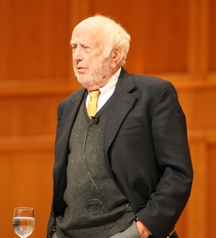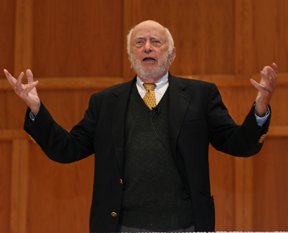 Worldwide economic reform fails in large measure because developing countries attempt to implement institutions and systems that exist in the United States. The lack of understanding of individual cultures and societies has been the fundamental failing of many reform efforts, according to Nobel Laureate Douglass C. North, who gave the 2006 Benjamin A. Rogge Memorial Lecture at Wabash.
Worldwide economic reform fails in large measure because developing countries attempt to implement institutions and systems that exist in the United States. The lack of understanding of individual cultures and societies has been the fundamental failing of many reform efforts, according to Nobel Laureate Douglass C. North, who gave the 2006 Benjamin A. Rogge Memorial Lecture at Wabash.
Click here to watch North's Rogge Lecture.
North is the Spencer T. Olin Professor in Arts and Sciences at Washington University in St. Louis. He was co-recipient of the Nobel Memorial Prize in Economics in 1993. He also has consulted with institutions and countries around the world, and has published groundbreaking work in economic history and theory.
While on campus, Dr. North gave the Rogge Lecture, discussed his efforts to link cognitive science with economic theory, and sat with reporters to discuss a wide range of topics. Here's a sample collection of his remarks during his visit to Wabash:
On education: In all my work, I try to get kids to think for themselves. An undergraduate college education is about learning to think; to study the many problems in the world and to think creatively about how to solve them. As economists, we try to make academic issues relevant to the real world. I’m interested in using economics to solve real world problems.
On the rising costs of higher education: I’m very unhappy about the costs of higher education. I don’t think the quality is growing with the cost. I believe in teaching and believe it should be done well. Colleges and universities have gone crazy hiring researchers and building new facilities without improving the quality of teaching. There has been, however, an enormous increase in subsidizing college education. There are more resources available to students than ever before, but you have to know where to look.
 On the World Bank’s economic development initiatives: The World Bank has spent $136 billion in development and has nothing to show for it. The old model doesn’t work. We need to move in the direction of devising institutions and systems that fit into a particular society — institutions that provide incentives to people who are more creative and more productive.
On the World Bank’s economic development initiatives: The World Bank has spent $136 billion in development and has nothing to show for it. The old model doesn’t work. We need to move in the direction of devising institutions and systems that fit into a particular society — institutions that provide incentives to people who are more creative and more productive.
On economic reform: The reform efforts by people favoring markets have been failures or perceived failures. So countries are moving in the direction of populism, which is an even bigger failure. Years ago I was an advisor to the Venezuelan government. We had created a model where money from oil would be given to the people, but limited to education and training. [Hugo] Chavez is using the oil money to give to the poor, to lift them up, but because he put no restrictions on the money, it’s only temporary.
The United States is an open access society; it can only exist with competition in economic markets and political markets. In an open access society, competition is essential; it provides incentives to topple monopolies. Here in the United States, we’ve had competition, which has led to the evolution of our economy. And it simply doesn’t work unless you’ve got competition in the political markets.
The U.S. is the most successful open access society, but Western Europe, Japan, and Taiwan are all moving forward. But we’re still the exception: three-quarters of the world is the "natural state" (where the political elite and economic elite are complementary).
Why reform fails: Reform fails because of too much imitation of the United States. They’ve got to restructure the game. Until you understand a society’s history and culture, you cannot change its economy. There are some basic doorstep conditions to moving to an open access society:
1) You’ve got to create impersonal exchange; conditions in which rules and laws are in place for everybody. In the natural state, personal exchange dominates. What you need to have is a situation where it’s not who you know, but what you know.
2) You must create institutions and organizations that are consistent with the culture and heritage of the individual society.
3) Military forces must be subordinate to civilian control, which is, of course, a very big order.
On China: China, with a population of 1.3 billion, is an example of a country with a monumental growth rate; it’s developing rapidly in conditions that don’t resemble the U.S. And it is, perhaps, the most extraordinary [economic] revolution in history. But it’s happening too fast, too many people are moving to the coasts. People are moving from the country to the city where there’s not enough employment. So, I’ve suggested moving enterprise into the interior of the country. It’s gradually happening, but there is still a long way to go.
On the economic success of the United States: The success of the United States is due to adaptive efficiency; institutions that encourage trial and error, that encourage innovation. We’ve had the continual ability to innovate. And enough institutions survive for us to keep evolving. So, in terms of reform, providing a structure that can evolve over time is the problem.
Prior to his appointment at Washington University-St. Louis, North spent 32 years at the University of Washington at Seattle, where he was director of the Institute for Economic Research for five years and chairman for 12 years. He was editor of the Journal of Economic History for five years and president of the Economic History Association in 1972. He was a 20-year member of the Board of Directors of the National Bureau of Economic Research until 1986. North received his B.A. in 1942 and his Ph.D. in 1952 from the University of California at Berkeley.